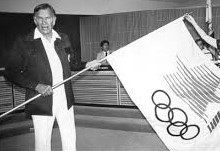The NBA Finals date back to 1947 (when they were known as the Basketball Association of America Finals) and the very 1st NCAA tourney was held in 1939. Olympic basketball competition is even older: it debuted as a demonstration event in 1904 and the men’s version became a medal sport in 1936, with the women finally getting their chance to go for the gold in 1976. The United States has dominated Olympic basketball competition from the start: the men have won 15 gold medals in the 18 tournaments they have participated in during the past 84 years, while the women have won 8 gold medals in the 10 tournaments in which they have competed during the past 44 years. Those of you who were looking forward to the 2020 Olympics opening ceremonies in Tokyo on July 24, 2020 will have to wait an extra 364 days, as the coronavirus caused a postponement until July 23, 2021. Due to the absence of college basketball since mid-March, HoopsHD’s Jon Teitel decided to fill the void by trying to interview as many prior Olympic players/coaches as possible so that you have something to read this summer while not watching the Summer Games. We continue our coverage by chatting with Professor Alex Kupfer, author of “Sporting Labor in the Hollywood Studio System: Basketball, Universal Pictures, and the 1936 Berlin Olympics”, about Frank Lubin winning a gold medal in 1936. Today marks the 21st anniversary of Frank’s passing in 1999 so we are proud to honor his memory.
 (photo credit: calisphere.org)
(photo credit: calisphere.org)
Lubin was born/raised in California: what made him choose UCLA for college? His parents were Lithuanian immigrants but he was a native Californian.
He was 6’7”: how much of an advantage was his size on the court? At the time it was framed as a huge advantage but the 1936 Olympic team had a few other guys of that size. It was certainly a way to promote him but he was actually listed by UCLA as a guard! It is comparable to someone like Magic Johnson/LeBron James who were tall but could handle the ball. The US would alternate different AAU rosters during the Olympics: Joe Fortenberry was the leading scorer when the McPherson team played and Frank was the leading scorer when the Universal team played so it seemed like both offenses ran through their respective big men. It worked out well for them to have a dual system because the International Basketball Federation did not want any team having more than 7 players dressed for a game.
After college he worked at Universal Pictures and played on the studio’s AAU team, where he would dress up as Frankenstein to help promote the studio’s 1935 movie “The Bride of Frankenstein”: how did he balance playing basketball with playing a monster? Playing the monster took precedence over playing basketball. He would be dressed up in full costume and then have to miss the 1st 5-10 minutes of each game while he changed into his basketball uniform. The team trainer Jack Pierce did the makeup for all of Universal’s movie monsters and it was more important for Frank to promote the studio. His height on platform shoes was almost 7’ tall so that is why they wanted him. The studios really took it seriously: Lubin was a grip and others were electricians and they were all paid well.
His team won the Olympic Trials and earned the right to represent the US as part of the 1st Olympic basketball tournament in 1936: how big a deal was it at the time? Pro basketball was not as established back then so there was an 8-team tourney at Madison Square Garden and Universal squeaked by McPherson in the final by a score of 44-43. The US took both squads and they just alternated from game to game. I think it was quite important to him because it was an important part of US basketball history. After the Olympics he became a big part of Lithuanian basketball history and took pride in both countries.
What did it mean to him to represent the US, and what did it mean to him to win a gold medal? He was really proud of that: to be the 1st team to win it. Sam Balter was the only Jewish American to win a gold medal in Berlin so it was important for the rest of the team as well, even though basketball was not as important back then. The final game was a 19-8 win over Canada and was played outdoors in the rain so it was not the giant sport that we know today! Leni Riefenstahl shot over 1 million feet of film for a documentary but she did not send any of her crew members to film basketball. During the 1980s a lot of guys started to give oral interviews and discuss their past Olympic experiences.
After the Olympics he became Lithuania’s 1st national team head coach where he won 2 EuroBasket titles in a 3-year span, winning the latter 1 by scoring the game-winning basket with 1 second left: how did he like being a coach, and how do his countrymen view the “grandfather of Lithuanian basketball”? He really helped set up their entire basketball system, both the men and the women. He appreciated the connection to his own family’s history and set it up in enduring fashion. To go right from the Olympics to Lithuania while giving up 3 years of opportunities in America shows how important it was to him.
He continued to play AAU and YMCA basketball into his 50s until knee problems forced him to retire: do you agree with those who consider him 1 of the greatest players in AAU history? He gets mentioned in the rarefied air of AAU basketball along with fellow Olympians like Bob Kurland. After they returned to the US the players lost their jobs because the Universal Studios owner was a German-born Jew and did not want anything to do with Nazi Germany. Lubin then switched over to Fox and was part of an incredibly successful AAU team while also working on shows like “The Beverly Hillbillies”.
He has been inducted into several Halls of Fame including UCLA and the Helms Athletic Foundation: where do these rank among the highlights of his career? UCLA does not have an online exhibit about its Hall of Fame so I could not find out much about that. The 1936 team seems to get rediscovered every 4 years and he looked back fondly on his time as an Olympian.
He passed away in 1999: when people look back on his career, how do you think that he should be remembered the most? The 1936 Olympics have gotten a lot of attention due to Jesse Owens and “The Boys in the Boat” book (www.amazon.com/Boys-Boat-Americans-Berlin-Olympics/dp/067002581X) but the basketball team set a long long legacy of basketball dominance. The Universal team was not just dominant at the Olympics but also beat a lot of college/AAU teams in the US.
For more info about the 1936 US Olympic team check out “Sporting Labor in the Hollywood Studio System: Basketball, Universal Pictures, and the 1936 Berlin Olympics” by Professor Alex Kupfer at: https://cinema.usc.edu/spectator/35.2/2_Kupfer.pdf and “Netting Out Basketball 1936” by Rich Hughes at: www.amazon.com/Netting-Out-Basketball-1936-Remarkable/dp/1770679707



